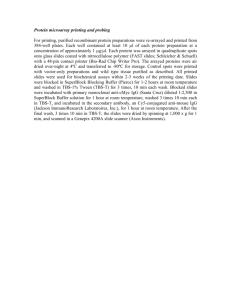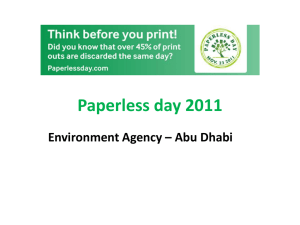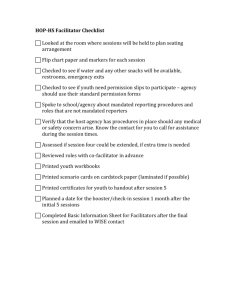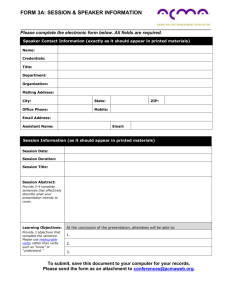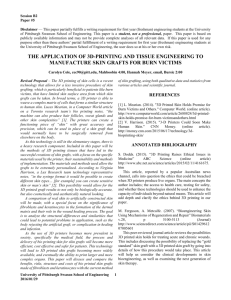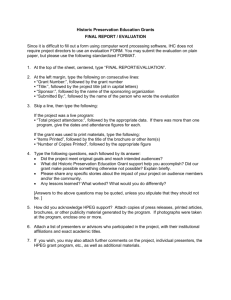A PAPERLESS SOCIETY - McGraw Hill Higher Education
advertisement
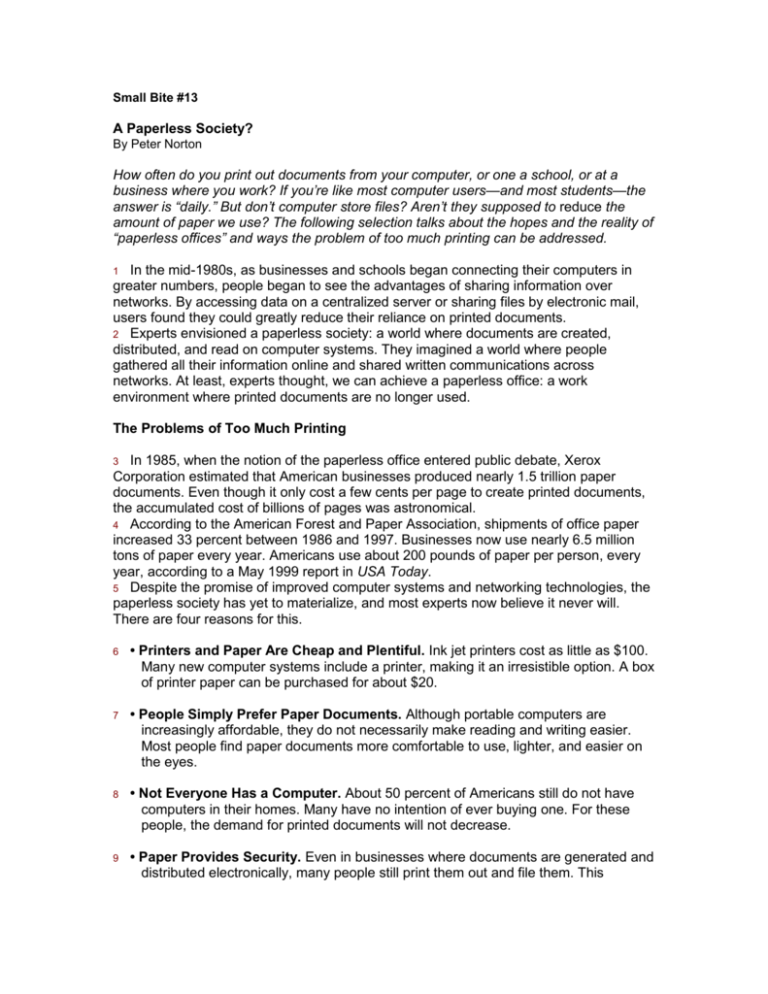
Small Bite #13 A Paperless Society? By Peter Norton How often do you print out documents from your computer, or one a school, or at a business where you work? If you’re like most computer users—and most students—the answer is “daily.” But don’t computer store files? Aren’t they supposed to reduce the amount of paper we use? The following selection talks about the hopes and the reality of “paperless offices” and ways the problem of too much printing can be addressed. In the mid-1980s, as businesses and schools began connecting their computers in greater numbers, people began to see the advantages of sharing information over networks. By accessing data on a centralized server or sharing files by electronic mail, users found they could greatly reduce their reliance on printed documents. 2 Experts envisioned a paperless society: a world where documents are created, distributed, and read on computer systems. They imagined a world where people gathered all their information online and shared written communications across networks. At least, experts thought, we can achieve a paperless office: a work environment where printed documents are no longer used. 1 The Problems of Too Much Printing In 1985, when the notion of the paperless office entered public debate, Xerox Corporation estimated that American businesses produced nearly 1.5 trillion paper documents. Even though it only cost a few cents per page to create printed documents, the accumulated cost of billions of pages was astronomical. 4 According to the American Forest and Paper Association, shipments of office paper increased 33 percent between 1986 and 1997. Businesses now use nearly 6.5 million tons of paper every year. Americans use about 200 pounds of paper per person, every year, according to a May 1999 report in USA Today. 5 Despite the promise of improved computer systems and networking technologies, the paperless society has yet to materialize, and most experts now believe it never will. There are four reasons for this. 3 6 7 8 9 • Printers and Paper Are Cheap and Plentiful. Ink jet printers cost as little as $100. Many new computer systems include a printer, making it an irresistible option. A box of printer paper can be purchased for about $20. • People Simply Prefer Paper Documents. Although portable computers are increasingly affordable, they do not necessarily make reading and writing easier. Most people find paper documents more comfortable to use, lighter, and easier on the eyes. • Not Everyone Has a Computer. About 50 percent of Americans still do not have computers in their homes. Many have no intention of ever buying one. For these people, the demand for printed documents will not decrease. • Paper Provides Security. Even in businesses where documents are generated and distributed electronically, many people still print them out and file them. This practice is rooted in an ongoing distrust of computers. A paper copy makes the distrustful computer user feel more secure. Despite the reasons for printing documents, computer users should consider the negative effects of producing so many hard copies. First, deforestation is a global problem because we cut down trees to make paper. Second, if printed documents are not archived, they are discarded, adding to the world's solid waste problems. Third, printing requires a lot of energy―from producing the paper to running it through a printer. 10 What Can You Do? Computer users should be responsible about using paper and energy. This practice requires thought and discipline but can actually make your work life easier and less expensive, saving you time, storage space, and money. There are three simple steps you can take. 11 12 1. Think Before You Print. Do you really need a hard copy? Are people asking for a hard copy when an e-mail attachment would work just as well? If you plan to stick the printout in a file cabinet, add it to a stack of papers, or throw it out, you may not need to print it. 13 2. Archive on Disk. If you are concerned that your electronic documents will be lost or altered, back them up and store them on removable media such as a floppy disk. Kept in a safe place, the electronic copy will not change and will always be accessible. 14 3. Encourage Others to Print Wisely. When someone brings you a printed document, ask him or her to send it by email or to give it to you on disk next time. These practices can actually be faster than waiting for a printout. Source: Peter Norton, Computing Fundamentals, 4th ed., 2001. New York: The McGraw-Hill Companies, Inc., p. 83. VOCABULARY CHECK Use the context clues from both sentences to reason out the meaning of the italicized words. The answer you choose should make sense in both sentences. ____1. Even though it only cost a few cents per page to create printed documents, the accumulated cost of billions of pages was astronomical. In recent years there has been an astronomical increase in government spending. Astronomical (#s.trM-n8mZ2-kMl) is an adjective that means (paragraph 3) a. immense; extremely large. b. carefully planned. c. barely noticeable. d. related to the sky or stars. ____2. Despite the promise of improved computer systems and networking technologies, the paperless society has yet to materialize, and most experts now believe it never will. The clouds gathered and the sky darkened, but the storm did not materialize. Materialize (mM-tîrZ*-M-l1z.) is a verb that means (paragraph 5) a. to become fabric. b. to fade away. c. to return d. to become real or actual. ____3. First, deforestation is a global problem because we cut down trees to make paper. When deforestation has occurred, rain washes away the bare top soil. Deforestation (d*-fôrZ2st "ZshMn) is a noun that means (paragraph 10) a. the cutting down and clearing away of the trees or forest. b. the planting of forests. c. the viewing of forests. d. the adding of trees to a forest. ____4. Second, if printed documents are not archived, they are discarded, adding to the world's solid waste problems. My mother has gathered important family records, labeled them, and archived them in a fireproof box. Archived (ärZk1vd.) is a verb that means (paragraph 10) a. photocopied. b. shredded. c. grouped into separate stacks or files. d. stored a place where documents are collected. ____5. Second, if printed documents are not archived, they are discarded, adding to the world's solid waste problems. We separated out the glass and plastic items for recycling, and discarded the rest. Discarded (d2-skärdZMd) is a verb that means (paragraph 10) a. set aside and saved. b. evaluated thoroughly. c. threw away. d. tied up. COMPREHENSION CHECK Read each of the following questions. Then select the correct answer choice. Base your answers on information in the selection. You may refer to the selection as you answer the questions. True or False ____1. Two decades ago experts predicted that paper would no longer be needed in offices. ____ 2. Americans use about 250 pounds of paper per person each year. ____ 3. Because people still distrust computers, they feel more secure printing copies of documents. Multiple-choice _____4. Which of the following is not an effect of printing so many hardcopies (paper copies) of documents? a. deforestation b. cheap and plentiful paper c. adding to the world’s solid waste problem d. the use of energy to run printers _____5. One of the suggested ways to reduce the unnecessary use of paper is to a. order employees not to print more than 20 pages a day. b. store documents on removable media and keep the electronic copy in a safe place. c. charge businesses more for paper. d. remove copy machines from offices. WRITING PROMPTS Give your responses to each of the following items. 1. Do you waste paper? If so, how did it get to be that way? If not, how did you learn to be careful in your use of it? 2. List at least three things in the selection that were new to you or that you found interesting.
